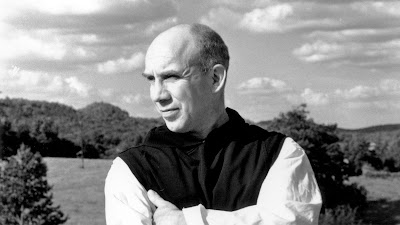I'm reading Elected Silence by Thomas Merton, which was (bizarrely) the title initially used in the UK for his autobiography, better known as The Seven-Storey Mountain. I began to read it many years ago, but I don't think I got further than a few pages on that occasion. Other than that, I've never read anything by Merton.
This is a bit strange, I suppose, given my long-standing interest in converts. In fact, I am reading the book as research for the next article in my converts series in St. Martin's Magazine.
I was bound to come to Merton eventually. I'm fairly familiar with his story from various books about converts that I've read during the years. (A Century of Catholic Converts by Lorene Hanley Duquin may be the best of these. I recommend it. It's so good I bought it twice, once for myself and once as a gift for the lady who eventually became my wife.)
But I'd always felt a bit iffy about Merton. The wrong sort of people were keen on him, I thought. And his flirtation with Eastern religion was a bit troubling.
My distrust was deepend by this article on the Catholic Answers website. All in all, I thought, I would avoid Merton.
However, he has since received praise from the highest source, the Pope himself. In his 2015 speech to the US Congress, the Holy Father said: "Merton was above all a man of prayer, a thinker who challenged the certitudes of his time and opened new horizons for souls and for the Church. He was also a man of dialogue, a promoter of peace between peoples and religions."
Does this mean all Catholics are obliged to revere Merton? Obviously not. We all know there is a hot debate within the Church on how far we are to adhere to the Pope's judgement when he is not speaking infallibly. Personally, I consider it wisest to follow rather closely, and therefore I'm happy to consider Merton "safe" (while reserving the right to read him critically).
And he can't be too bad, because one of the things his memoir did was push me into the confessional, which I had avoided for too long.
It's a good book. Thomas Merton seems to have been the sort of extroverted, go-getting, effortlessly competent type of person who is in many ways the complete opposite to myself. Although he lingers on his flaws and failures, the picture I get from reading his memoir is of someone who excelled academically and socially-- so much so that he placed no particular value on his success, and even felt somewhat ashamed of it. So, to this degree, I find it hard to relate to him. (I'm still quite a shy person, but if I was to describe my childhood and adolescent shyness readers would find it hard to believe. And I was definitely a C-to-B student at school-- except at English, where I excelled, and at mathematics, where I was always very happy to scrape a bare pass.)
Merton was also (by a certain point in his life) drawn towards silence and solitude, something I've never experienced at all.
However, I still find a lot of interesting stuff in the book. What prompted this blog post was one passage in particular, in which he describes a train journey to Gethsemani monastery in Kentucky, to attend a Trappist retreat (this was before he became a Trappist):
So when we entered Cincinnati, in the evening, with the lights coming on among all the houses and the electric signs shining on the hills, and the huge freight yards swinging open on either side of the track and the high buildings in the distance, I felt as if I owned the world. And yet that was not because of all these things, but because of Gethsemani, where I was going. It was the fact that I was passing through all this, and did not desire it, and wanted no part in it, and did not seek to grasp or hold any of it, that I could exult in it, and it all cried out to me: God! God!


I would be interested to read your thoughts on Merton. Since I am as daft as a brush I avoid him due to the flirting towards the East but would like to know your opinion. Sinéad.
ReplyDeleteHi Sinéad. I will write something about my opinions on him. From what I read I know that later Merton is very different from the Merton of the autobiography and he even distanced himself from it himself. The autobiography is a very moving testament to the love of God and the desire for self-surrender and it even got me to go to confession, which I hadn't done in far too long. However, even here his leftiness is a bit excessive. There's a description of Friendship House in Harlem which I can't help feel lapses into morbid white guilt and making a fetish out of African-Americans. Maybe I'm wrong about that, though-- I'm open to that possibillity. In any case, I have to do more reading on the later Merton.
Delete